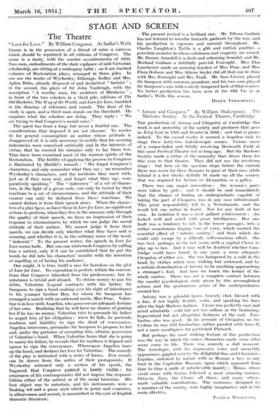STAGE AND SCREEN
The Theatre
"Love for Love." By William Congreve. At Sadler's Wells
THERE is in the possession of a friend of mine a cartoon which should- be reprinted in all editions of Congreve. The scene is a study, with the sombre accoutrements of 1850. Two-men, embodiments of the dark vigilance of mid-Victorian scholarship, are sitting at a mahogany table ; on it are stacked volumes of Restoration plays, arranged in three piles. In one are the works of Wycherley, Etherege, Sedley and Mrs. Aphra Behn, already disposed of and docketted " Satirist " ; in the second, the plays of Sir John Vanbrugh, with the inscription " A worthy man, the architect of Blenheim " ; in front of the two scholars in a third pile, editions of The Old Bachelor, The Way of the World, and Love for Love, tumbled in the disarray of reference and search. The door of the study is open, and a third man standS on the threshold. He enquires what the scholars are doing. They reply : " We are trying to find Congreve's moral sense."
The quest has been a long, but never a-fruitful one. The considerations that imposed it are not obscure: To render fit for general consumption an author whose attitude is disapproved of, it is only necessary to certify that his seeming indecencies were conceived satirically and in the interests of virtue, that he erected his ninepins only to lay them low. Thus have been exorcized most of the wanton spirits of the Restoration. The futility of applying the process to Congreve is illustrated by Hazlitt's remark : " We forget Congreve's characters, and only remember what they say ; we remember Wycherley's characters, and the incidents they meet with, just as if they were real, and forget what they say, com- paratively speaking." The " indecency " of a set of charac- ters, in the light of a given code, can only be tested by their reactions to a set of circumstances, and the attitude of their creator can only be deduced from those reactions. We cannot deduce it from their speech alone. When the charac- ters of a play Dave, as have those in Love for Love, no significant actions to perform, when they live in the memory only through the quality of their speech, we have no impression of their response to circumstances by which we can judge the moral attitude of their author. We cannot judge it from their speech, we can decide only whether what they have said is amusing, and whether it is, in the ordinary sense of the word, " indecent." To the present writer, the speech in Love for Love seems both. But one can whitewash Congreve by calling him a satirist, only if it can be established that he put the words he did into his characters' mouths with the intention of repelling, or of boring his audience. One might, it is true build a case for boredom on the plot of Love for Love. Its exposition is perfect, within the conven- tions that Congreve inherited from his predecessors, but its substance is trivial and absurd. To obtain money to pay his debts, Valentine Legend contracts with' his father, Sir Sampson, to sign a bond making over his right of inheritance to his younger brother Ben, for whom . Sir Sampson has arranged a match with an awkward rustic, Miss Prue. Valen- tine is love with Angelica, who possesses an adequate fortune of her own. Realizing that he will have no chance of gaining her if-he has no money, Valentine tries to persuade his father to acquit him of, his ohligation ; when he fails, he pretends madneis and inability to sign the deed of conveyance. Angelica intervenes, persuades Sir Sampson to propose to her and, under the pretence of accepting him, obtains possession of Valentine's bond. When Valentine hears that she is going to marry his father, he reveals that his madness is feigned and agrees to sign the conveyance. Whereupon Angelica tears up the bond, and declares her love for Valentine. The comedy of the play is intricated with a series of farces. Few morals can be drawn from the antics of their protagonists: If Wycherley mirrored only a section of his epoch, the fragment that Congreve painted is barely visible his awareness of his-contemporaries, did not impose the- responsi- bilities either of the satirist or of the social historian. His 'first object was to entertain, and his instruments were a -flashing- wit- and :a:prose - style- which- itr point -and-concision, in allusiveness and accent, is unmatched in the-rest-of-English dramatic literature.
. The present revival is a brilliant one. Mr. Ty'rone Guthrie has not loitered to wreathe fantastic garlands by the way, and his production is vigorous and natural throughout. Mr. Charles Laughton's Tattle is a glib and ruttish prattler, a porcelain monster in whom oafishness and coquetry are mixed. Mr. Dennis Mundell is a sleek and scheming Scandal, and Mr. Morland Graham a faithfully peevish Foresight. Miss Elsa Lanchester made an amusing hoyden of Miss Prue, and Miss Flora Robson and Miss Athene Seyler did all that can he done with Mrs. Foresight and Mrs. Frail. Mr. Sam Livesey played Sir Sampson with sonorous grandeur, and his two sons played Sir Sampson's sons with a nicely tempered lack of filial respect. No better production has been seen at the Old Vic or at Sadler's Wells this season.
DEREK VERSCHOYLE.










































 Previous page
Previous page